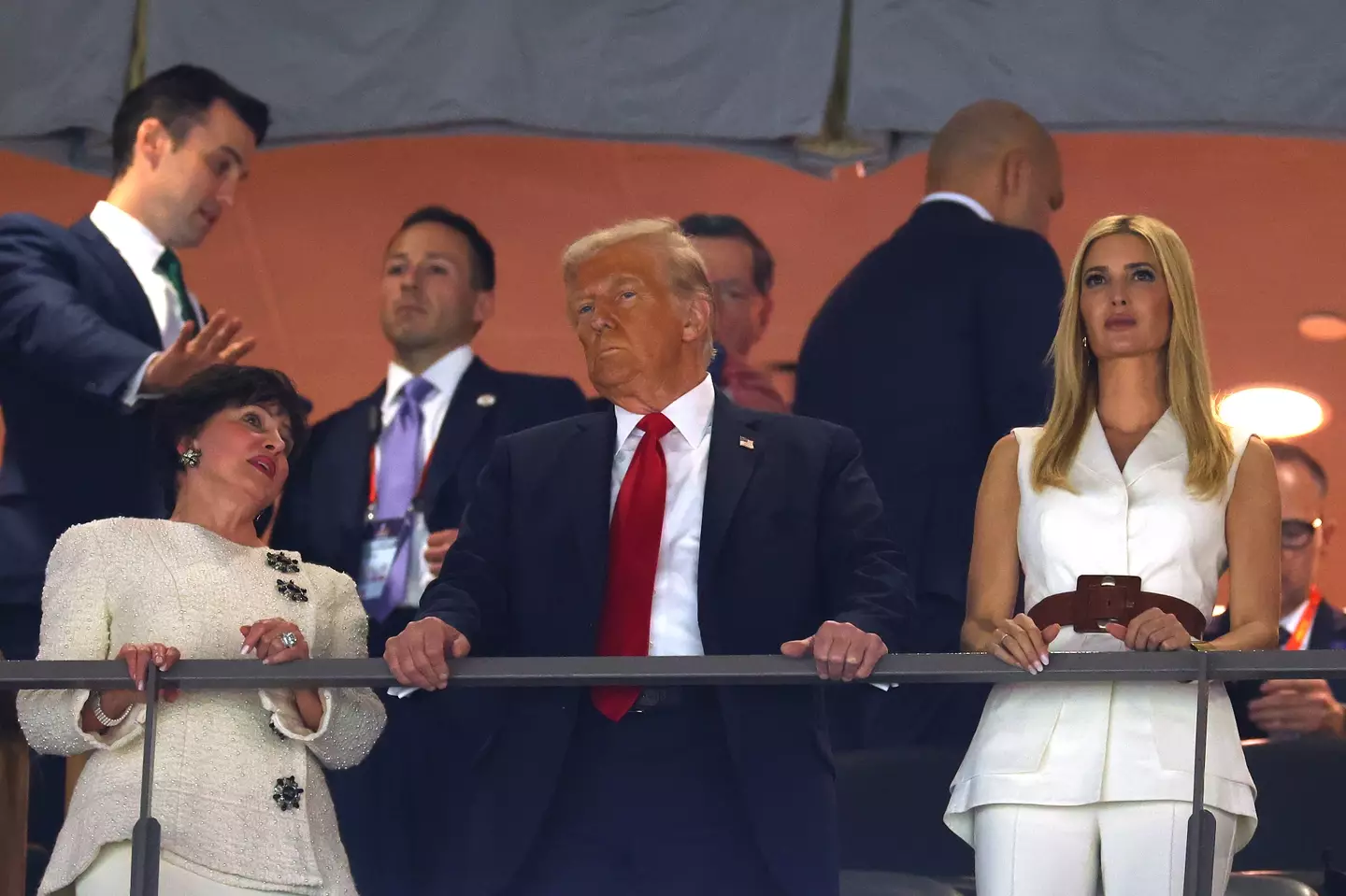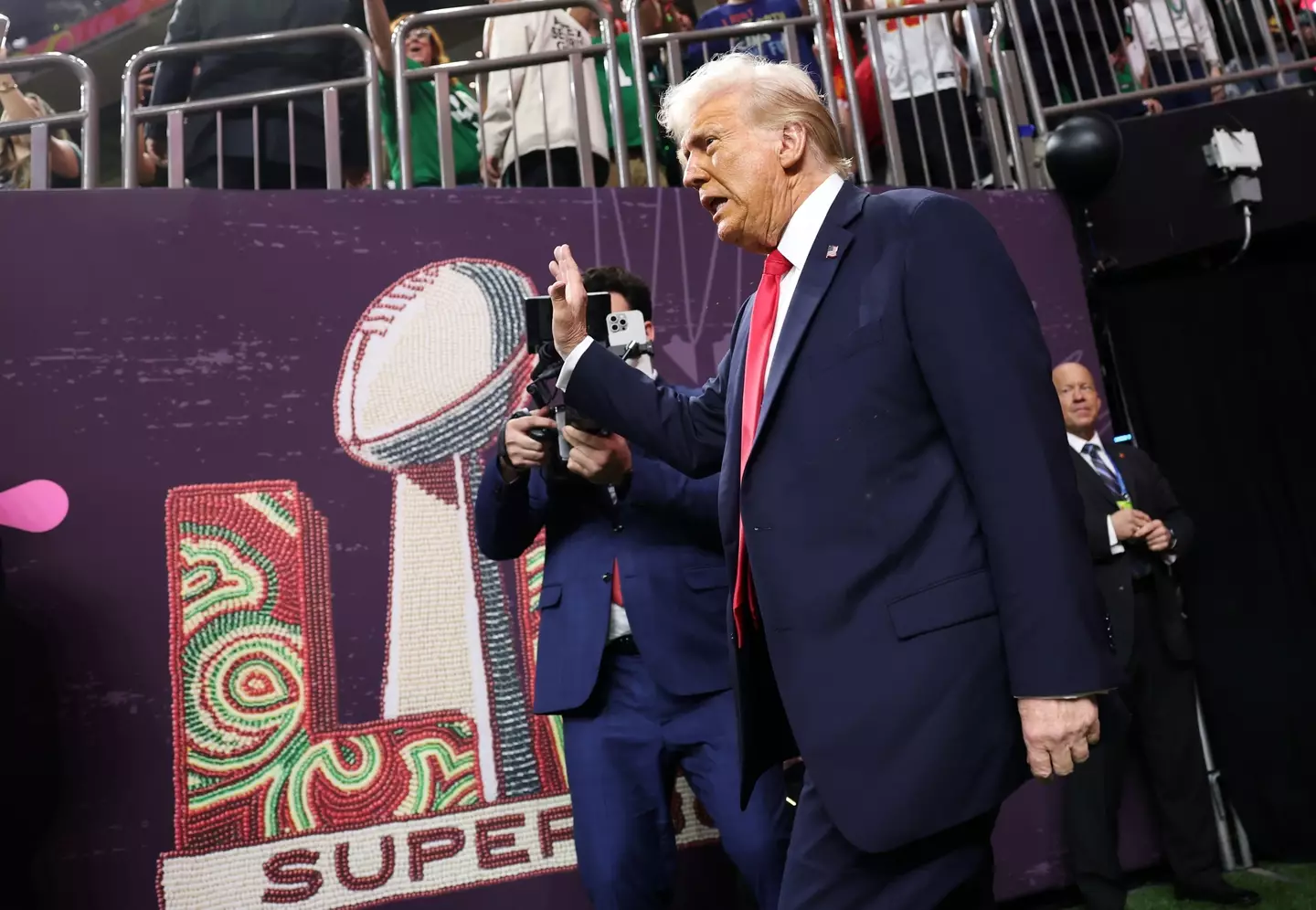On February 9, 2025, history was made as President Donald Trump became the first sitting U.S. president to attend the Super Bowl, joining the spectacle at New Orleans’ Caesars Superdome. However, his attendance took an unexpected turn when spectators observed that the 78-year-old Republican left the stadium much earlier than anticipated. The abrupt exit—captured by numerous eyewitnesses and later shared widely on social media—prompted a flurry of discussion and speculation about the reasons behind his early departure.
A Historic Yet Brief Appearance
Trump’s presence at the Super Bowl was undoubtedly historic. The event, known for its grandeur and cultural significance, had never before hosted a sitting president in its storied history. Despite this landmark occasion, the president’s visit was surprisingly short-lived. According to multiple reports, Trump was seen departing the Caesars Superdome well before the game reached its final quarter, leaving many fans and political commentators to wonder: why would a president, whose attendance was one of the event’s major talking points, leave so soon?

Trump became the first sitting president to attend the Super Bowl (Gregory Shamus/Getty Images)
Several theories have emerged to explain Trump’s early departure from the game. While no single explanation has been officially confirmed, the discourse can be broadly categorized into three main possibilities:
1. Disappointment Over the Chiefs’ Performance
One popular theory suggests that Trump may have been disappointed by the outcome of the game. With the Philadelphia Eagles defeating the Kansas City Chiefs 40-22, some speculate that the president—rumored by some to be a fan of the Chiefs—might have found the loss too disheartening. In this narrative, the president’s decision to leave early is seen as a personal reaction to his favored team’s performance.
Critics on social media even hinted that if Trump had indeed backed the Chiefs, his early exit might have been an unspoken protest against the loss. Although this theory taps into the fervor of sports fandom, it remains speculative without concrete evidence linking Trump’s personal allegiances to his decision-making that night.
2. A Response to Uncomfortable On-Field Moments
Another theory focuses on the broader atmosphere at the Super Bowl, particularly the controversy surrounding the treatment of celebrity figures. Earlier in the game, pop icon Taylor Swift—who was present to support her boyfriend, Kansas City Chiefs tight end Travis Kelce—was met with an unexpected barrage of boos from a segment of the crowd. Some observers noted that Swift’s visible discomfort and perplexed reaction (captured on the jumbotron as she mouthed, “Wait…what is going on?”) might have contributed to an overall uneasy atmosphere in the stadium.
In this scenario, Trump’s early departure could be interpreted as an attempt to distance himself from an environment that was becoming increasingly contentious. His decision to leave before the fourth quarter may have been motivated by a desire to avoid the escalating tensions on the field and in the stands.

Trump left the game early (Jamie Squire/Getty Images)
3. Logistical and Security Protocols
A more pragmatic explanation centers on the logistics and security challenges inherent in hosting a sitting president at such a massive public event. Attending the Super Bowl as the president requires a highly orchestrated operation involving the U.S. Secret Service, local law enforcement, and a host of logistical measures designed to ensure the president’s safety. The overall cost of these measures is staggering—estimated to range between $15 million and $20 million.
According to reports from MailOnline, Trump’s early departure was not a spontaneous decision but rather part of a prearranged schedule. The official White House itinerary dictated that the president leave the stadium at approximately 8:05 p.m. local time. This schedule was meticulously planned to mitigate potential security risks, such as the possibility of being surrounded by the 80,000-strong crowd as the game concluded, especially given the recent heightened security concerns following a terror attack on Bourbon Street in New Orleans.
Leaving early allowed Trump to board Air Force One without the risk of a large, unruly crowd impeding his exit. This explanation underscores that the decision was less about personal preference and more about adhering to stringent security protocols designed to protect the president in high-risk environments.
The Role of Security and Recent Events
The context of Trump’s departure is further complicated by the increased security measures in place due to recent events in New Orleans. The recent terror attack on Bourbon Street—which tragically claimed 14 lives and resulted in numerous injuries—had already necessitated a ramp-up in security at the Superdome. With the city on high alert, ensuring the safety of a sitting president would have been paramount.
In such an environment, even a slight deviation from protocol could pose significant risks. The careful planning of Trump’s exit—ensuring he left before the stadium filled to capacity at the game’s end—was likely a strategic move designed to minimize exposure to potential threats. The logistical realities of transporting a president in a safe and secure manner often necessitate leaving early, regardless of the event’s schedule.
Public and Social Media Reactions
Unsurprisingly, Trump’s early exit ignited a firestorm on social media. Fans and critics took to platforms like X (formerly Twitter) and Facebook to voice their opinions. One particularly scathing comment read, “Taxpayers paid over $20 million for Felon Donald Trump to attend half the Super Bowl,” a remark that reflected the frustration of some viewers over what they perceived as a waste of public funds. The mention of “DOGE” in the same tweet added a humorous touch, referencing the popular cryptocurrency in a mocking tone.
Other users weighed in on the security aspect, with one remarking, “Not just Trump—every U.S. President has to leave major events early because of security protocols. It’s nothing personal.” These comments highlight the polarized nature of the discussion: while some saw Trump’s early exit as a deliberate political statement or a sign of disappointment, others defended it as a necessary measure in a complex security environment.
Comparing Reactions: Trump vs. Taylor Swift
The contrast between the reactions to Trump’s departure and those directed at Taylor Swift during the game added another layer to the unfolding narrative. While Trump was met with cheers and support from segments of his base, Taylor Swift faced a different kind of scrutiny. The boos aimed at Swift—stemming from her past affiliation with the Philadelphia Eagles before dating Kelce—elicited a mixture of sympathy and criticism from fans.
One notable social media post observed, “Taylor Swift got mercilessly booed. Trump got a hero’s welcome. Total culture shift.” This stark comparison between the treatment of the two public figures underlines the complexities of celebrity and political culture in today’s America. Where Trump’s actions were defended by his supporters as pragmatic, Swift’s experience was widely regarded as unfair, eliciting a chorus of empathy and solidarity from her fans.
The Broader Cultural Implications
The events at Super Bowl LIX serve as a microcosm of the current cultural landscape, where the lines between sports, politics, and celebrity are increasingly blurred. The Super Bowl, already a spectacle of athletic achievement and entertainment, has once again proven to be a stage for broader societal debates. Trump’s historic yet brief appearance, coupled with the mixed reactions to both his and Swift’s treatment, reflects a nation deeply divided in its views on leadership, celebrity, and public accountability.
In this context, the early departure of a sitting president—despite the massive expenditure and high expectations—raises important questions about the role of political figures at major cultural events. It prompts a discussion about the expectations placed on public figures and the delicate balance between security, personal expression, and public perception.

